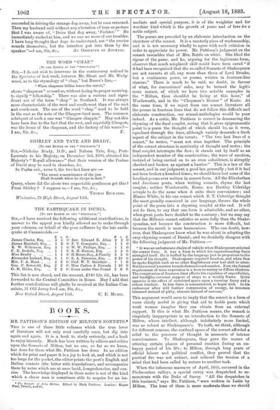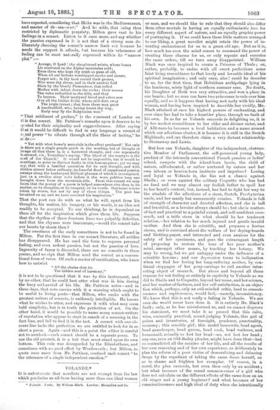BOOKS.
MR. PATTISON'S EDITION OF MILTON'S SONNETS.• THIS is one of those little volumes which the true lover of literature will not only read carefully once, but dip into again and again. It is a book to study seriously, and a book to enjoy leisurely. Much has been written by editors and critics upon the Sonnets of Milton, but no one, so far as we know, has done for them what Mr. Pattison has done. In an edition which for print and paper it is a joy to look at, and which is not too large for the pocket, the editor prints the poet's English and Italian sonnets (the latter with translations), and accompanies them by notes which are at once lucid, Comprehensive, and con- cise. The knowledge displayed in these notes is not of the kind which a clever man is sometimes able to acquire for an im- • The Sonnets of John Mdton. Edited by Mark Pattnion. London : Kogan Paul, Trench, and 0o. mediate and special purpose, it is of the weightier and far worthier kind which is the growth of years and of love for a noble subject.
The poems are preceded by an elaborate introduction on the stricture of the sonnet. It is a masterly piece of workmanship, and it is not necessary wholly to agree with such criticism in order to appreciate its power. Mr. Pattison's judgment on the sonnet resembles that of Mrs. Battle on whist. She liked the rigour of the game, and he, arguing for the legitimate form, observes that much misplaced skill would have been saved " if it had been recognised that the so-called Sonnets of Shakespeare are not sonnets at all, any more than those of Lord Brooke, but a continuous poem, or poems, written in fourteen-line stanzas." There is much to be said, no doubt, in favour of what, for convenience' sake, may be termed the legiti- mate sonnet, of which we have two notable examples in the " Milton, thou shouldst be living at this hour," of Wordsworth, and in the " Chapman's Homer " of Keats. At the same time, if we reject from our sonnet literature all the poems in fourteen lines that do not follow this difficult and elaborate construction, our sonnet-anthologies would be poor indeed. As a critic, Mr. Pattison is correct in denouncing the rhyming of the final couplet, seeing that it gives epigrammatic point to a poem the thought of which should be, as it were, equalised through the lines, although variety demands a fresh aspect of the subject in the tercets. " The two last lines of a sonnet," be writes, " must not rime together. The principle of the sonnet structure is continuity of thought and metre; the final couplet interrupts the flow ; it stands out by itself as an independent member of the construction ; the wave of emotion, instead of being carried on to an even subsidence, is abruptly checked and broken as against a barrier." This is a law of the sonnet, and in our judgment a good law generally ; but if it had not been broken a hundred times, we should have lost some of the loveliest poems ever written in sonnet form. All the Elizabethan and Jacobean poets, when writing sonnets, rhyme the last couplet ; neither Wordsworth, Keats, nor Hartley Coleridge scruple to do the same when it suits their convenience ; and Blanco White, in his one sonnet which S. T. Coleridge thought the most grandly conceived in our language, throws the whole point of the poem into a rhyming couplet at-the end. It will not do then, to say that one form is admissible, and no other, when great poets have decided to the contrary ; but we may say that the Miltonic sonnet satisfies us more fully than the Shake- spearian, not because the construction is more difficult, but because the result is more harmonious. Who can doubt, how- ever, that Shakespeare knew what he was about in adopting the easy-rhyming sonnet of Daniel ; and we decidedly disagree with the following judgment of Mr. Pattison :—
" It was an unfortunate choice of vehicle when Shakespeare selected the sonnet form. It was a form in which his superabounding force strangled itself. He is baffled by the language just in proportion to the power of his thought. Shakespeare required freedom, and when free he spoke English such as no other Englishman ever had skill to utter. But the sonnet's narrow bounds demand condensation. Now, the formal requirement of terse expression is a boon to watery or diffuse thinkers. The compression of fourteen lines effects the expulsion of superfluities, and lendsitbe external support of stays to a weakly frame. Quite opposite is the effect of restricted space upon a teeming fancy and a robust intellect. In him force is concentrated, to begin with. In his endeavour after still further compression of energy, he becomes laboured instead of pithy, obscure instead of nervous."
This argument would seem to imply that the sonnet is a form of verse chiefly useful in giving that aid to feeble poets which weak women imagine they can obtain from an external support. If this is what Mr. Pattison means, the remark is singularly inappropriate in an introduction to the Sonnets of Milton, whose intellect, although indefinitely more limited, was as robust as Shakespeare's. To both, we think, although for different reasons, the confined space of the sonnet afforded a relief to the pressure of thought in moments of intense consciousness. To Shakespeare, they gave the means of
uttering certain phases of personal emotion during an un- happy period of his life ; to Milton, through long years of official labour and political conflict, they proved that the poetical fire was not extinct, and relieved the tension of a mind that bad been called by nature to another task.
When the infamous massacre of April, 1655, occurred in the Piedmontese valleys, a special envoy was despatched to re- monstrate with the Duke of Savoy. "All the despatches in this business," says Mr. Pattison, " were written in Latin by Milton. The tone of them is more moderate than we should have expected, considering that Blake was in the Mediterranean,
and master of th sea-co tat." And he adds, that -aeing thus restricted by diplomatic propriety, Milton gave vent to his
feelings in a sonnet. Listen to it once more, and say whether the passion expressed in it is not that of a strong man de- liberately choosing the sonnet's narrow limit not because he needs the support it affords, tut because his vehemence of feeling can be most naturally expressed within its " narrow plot" :—
" Avenge, 0 Lord ! thy slaughtered saints, whose bones
Lie scattered on the Alpine mountains cold ;
Even them who kept tby truth so pure of old,
When all our fathers worshipped stocks and stones, Forget not ; in thy book record their groans, Who were thy sheep, and in their ancient fold Slain by the bloody Piemontese, that rolled Mother with infant down the rocks; their moans The vales redoubled to the hills, and they To heaven. Their martyred blood and ashes sow O'er all the Italian fields, where still doth sway
The triple tyrant ; that from these may grow A hundredfold, who, having learnt thy way,
Early may fly the Babylonian woe."
"That sublimest of psalms," is the comment of Landor on tl is fine sonnet. Mr. Pattison's remarks upon it deserve to be quoted for their originality and suggestiveness. After saying tlat it would be difficult to find in any language a sonnet of ecual power "to vibrate through all the fibres of feeling," he ai ds :—
" Yet with what homely materials is the effect produced ! Not only is there not a single purple patch in the wording, but of thought or image all that there is, is a borrowed thought, and cue repeatedly lxrrowed, viz., Tertullian's say ing, The blood of the martyrs is the seed of the Church.' It would not be impossible, but it would he sacrilege, to point to distinct faults in this famous piece ; yet we may say, that with a familiar quotation for its only thought, and with diction almost below ordinary, its forceful flood of suppressed passion sweeps along the hackneyed Biblical phrases of which it is composed, just as a swollen river rolls before it the worn pebbles long ago brought down from the mountain-side. From this sonnet we may learn that the poetry of a poem is lodged somewhere else than in its matter, or its thoughts, or its imagery, or its words. Our heart is here taken by storm, but not by any of these things. The poet has breathed on us, and we have received hie inspiration."
That the poet can do with us what he will, apart from his thoughts, his matter, his imagery, or his words, is an idea not readily to be accepted. To our thinking, he is dependent on them all for the inspiration which gives them life. Suppose that the rhythm of these fourteen lines was palpably defective, and that the rhymes were inaccurate,—would the sonnet take our hearts by storm then ?
The sweetness of the early sonnetteers is not to be found in Milton. For the first time in our sonnet literature, all artifice has disappeared. He has used the form to express personal feeling, and even ardent passion, but not the passion of love. Ingenuity of fancy is discarded, there are no conceits in these poems, and no sign that Milton used the sonnet as a conven- tional form of verse. Of such a master of versification, who knew how to untwist
" All the chains that tie The hidden soul of harmony,"
it is not to be questioned that it was by this instrument, and by no other, that he could best utter what was in him during the busy mi.l-period of his life. Mr. Pattison notes—and in these days, that note carries with it a warning which ought to be useful to living poets—that Milton, who ranks with the greatest writers of sonnets, is uniformly intelligible. He knows what he wishes to utter, and expresses it with what may seem bald simplicity, but is in truth the perfection of art. On the other hand, it would be possible to name many sonnet-writers of reputation who appear to start in search of a meaning in the first line, and fail to find it in the last. A sonnet with one ob- scure line lacks the perfection we are entitled to look for in so
short a poem. Again—and this is a point the editor is careful not tb overlook—each sonnet should be a separate poem. To use the old proverb, it is a tub that must stand upon its own bottom. This rule was disregarded by the Elizabethans, and
sometimes with no good effect by Wordsworth ; bat Milton, to quote once more from Mr. Pattison, confined each sonnet " to the utterance of a single independent emotion."



































 Previous page
Previous page